- Home
- Robert Jordan
Towers of midnight wot-13 Page 11
Towers of midnight wot-13 Read online
Page 11
But no. Young Bull would not accept the inferior victory of running his prey to exhaustion. He would taste the blood of the throat, pumping full force from a healthy heart. He would best his prey in its prime.
He began to vary his leaps, not following the stag's exact path. He needed to be ahead, not follow! The stag's scent grew more alarmed. That drove Young Bull to greater speed. The stag bolted to the right, and Young Bull leaped, hitting an upright tree trunk with all four paws and pushing himself sideways to change directions. His turn gained him a fraction of a heartbeat.
Soon he was bounding a single breath behind the stag, each leap bringing him within inches of its hooves. He howled, and his brothers and sisters replied from just behind. This hunt was all of them. As one.
But Young Bull led.
His howl became a growl of triumph as the stag turned again. The chance had come! Young Bull leaped over a log and seized the stag's neck in his jaws. He could taste the sweat, the fur, the warm blood beneath pooling around his fangs. His weight threw the stag to the ground. As they rolled, Young Bull kept his grip, forcing the stag to the forest floor, its skin laced scarlet with blood.
The wolves howled in victory, and he let go for a moment, intending to bite at the front of the neck and kill. There was nothing else. The forest was gone. The howls faded. There was only the kill. The sweet kill.
A form crashed into him, throwing him back into the brush. Young Bull shook his head, dazed, snarling. Another wolf had stopped him. Hopper! Why?
The stag bounded to its feet, and then bounded off through the forest again. Young Bull howled in fury and rage, preparing to run after it. Again Hopper leaped, throwing his weight against Young Bull.
If it dies here, it dies the last death, Hopper sent. This hunt is done, Young Bull. We will hunt another time.
Young Bull nearly turned to attack Hopper. But no. He had tried that once, and it had been a mistake. He was not a wolf. He— Perrin lay on the ground, tasting blood that was not his own, exhaling deeply, his face dripping with sweat. He pushed himself to his knees, then sat down, panting, shaking from that beautiful, terrifying hunt.
The other wolves sat down, but they did not speak. Hopper lay beside Perrin, setting his grizzled head on aged paws.
"That," Perrin finally said, "is what I fear."
No, you do not fear it, Hopper sent.
"You're telling me what I feel?"
You do not smell afraid, Hopper sent.
Perrin lay back, staring up at the branches above, twigs and leaves crumpling beneath him. His heart thumped from the chase. "I worry about it, then."
Worry is not the same as fear, Hopper sent. Why say one and feel the other? worry, worry, worry. It is all that you do.
"No. I also kill. If you're going to teach me to master the wolf dream, it's going to happen like this?"
Yes.
Perrin looked to the side. The stag's blood had spilled on a dry log, darkness seeping into the wood. Learning this way would push him to the very edge of becoming a wolf.
But he had been avoiding this issue for too long, making horseshoes in the forge while leaving the most difficult and demanding pieces alone, untouched. He relied on the powers of scent he'd been given, reaching out to wolves when he needed them—but otherwise he'd ignored them.
You couldn't make a thing until you understood its parts. He wouldn't know how to deal with—or reject—the wolf inside him until he understood the wolf dream.
"Very well," Perrin said. "So be it."
Galad cantered Stout through the camp. On all sides, Children erected tents and dug firepits, preparing for the night. His men marched almost until nightfall each day, then arose early in the morning. The sooner they reached Andor, the better.
Those Light-cursed swamps were behind them; now they traveled over open grasslands. Perhaps it would have been faster to cut east and catch one of the great highways to the north, but that wouldn't be safe. Best to stay away from the movements of the Dragon Reborn's armies and the Seanchan. The Light would shine upon the Children, but more than one valiant hero had died within that Light. If there was no danger of death, there could be no bravery, but Galad would rather have the Light shine on him while he continued to draw breath.
They had camped near the Jehannah Road and would cross it on the morrow to continue north. He had sent a patrol to watch the road. He wanted to know what kind of traffic the highway was drawing, and he was in particular need of supplies.
Galad continued on his rounds through camp, accompanied by a handful of mounted attendants, ignoring the aches of his various wounds. The camp was orderly and neat. The tents were grouped by legion, then set up forming concentric rings with no straight pathways. That was intended to confuse and slow attackers.
A section of the camp lay empty near the middle. A hole in the formation where the Questioners had once set up their tents. He had ordered the Questioners spread out, two assigned to each company. If the Questioners were not set apart from the others, perhaps they would feel more kinship with the other Children. Galad made a note to himself to draw up a new camp layout, eliminating that hole.
Galad and his companions continued through the camp. He rode to be seen, and men saluted as he passed. He remembered well the words that Gareth Bryne had once said: Most of the time, a general's most important function was not to make decisions, but to remind men that someone would make decisions.
"My Lord Captain Commander," said one of his companions. Brandel Vordarian. He was an older man, eldest of the Lords Captain who served under Galad. "I wish you would reconsider sending this missive."
Vordarian rode directly beside Galad, with Trom on his other side. Lords Captain Golever and Harnesh rode behind, within earshot, and Bornhald followed, acting as Galad's bodyguard for the day.
"The letter must be sent," Galad said.
"It seems foolhardy, my Lord Captain Commander," Vordarian continued. Clean-shaven, with silver washing his golden hair, the Andoran was an enormous square of a man. Galad was vaguely familiar with Vordarian's family, minor nobles who had been involved in his mother's court.
Only a fool refused to listen to advice from those older and wiser than himself. But only a fool took all of the advice given him.
"Perhaps foolhardy," Galad replied. "But it is the right thing to do." The letter was addressed to the remaining Questioners and Children under the control of the Seanchan; there would be some who had not come with Asunawa. In the letter, Galad explained what had happened, and commanded them to report to him as soon as possible. It was unlikely any would come, but the others had a right to know what had happened.
Lord Vordarian sighed, then made way as Harnesh rode up beside Galad. The bald man scratched absently at the scar tissue where his left ear had been. "Enough about this letter, Vordarian. The way you go on about it tries my patience." From Galad's observation, there were many things that tried the Murandian's patience.
"You have other matters you wish to discuss, I assume?" Galad nodded to a pair of Children cutting logs, who stopped their work to salute him.
"You told Child Bornhald, Child Byar, and others that you plan to ally us with the witches of Tar Valon!"
Galad nodded. "I understand that the notion might be troubling, but if you consider, you will see that it is the only right decision."
"But the witches are evil!"
"Perhaps," Galad said. Once, he might have denied that. But listening to the other Children, and considering what those at Tar Valon had done to his sister, was making him think he might be too soft on the Aes Sedai. "However, Lord Harnesh, if they are evil, they are insignificant when compared to the Dark One. The Last Battle comes. Do you deny this?"
Harnesh and the others looked up at the sky. That dreary overcast had stretched for weeks now. The day before, another man had fallen to a strange illness where beetles had come from his mouth as he coughed. Their food stores were diminishing as more and more was found spoiled.
"No, I do
not deny it," Harnesh muttered.
"Then you should rejoice," Galad said, "for the way is clear. We must fight at the Last Battle. Our leadership there may show the way of Light to many who have spurned us. But if it does not, we will fight regardless, for it is our duty. Do you deny this, Lord Captain?"
"Again, no. But the witches, my Lord Captain Commander?"
Galad shook his head. "I can think of no way around it. We need allies. Look about you, Lord Harnesh. How many Children do we have? Even with recent recruits, we are under twenty thousand. Our fortress has been taken. We are without succor or allegiance, and the great nations of the world revile us. No, don't deny it! You know that it is true."
Galad met the eyes of those around him, and one by one they nodded.
"The Questioners are at fault," Harnesh muttered.
"Part of the blame is theirs," Galad agreed. "But it is also because those who would do evil look with disgust and resentment upon those who stand for what is right."
The others nodded.
"We must tread carefully," Galad said. "In the past, the boldness—and perhaps overeagerness—of the Children has alienated those who should have been our allies. My mother always said that a victory of diplomacy did not come when everyone got what they wanted—that made everyone assume they'd gotten the better of her, which encouraged more extravagant demands. The trick is not to satisfy everyone, but to leave everyone feeling they reached the best possible result. They must be satisfied enough to do as you wish, yet dissatisfied enough to know that you bested them."
"And what does this have to do with us?" Golever said from behind. "We follow no queen or king."
"Yes," Galad said, "and that frightens monarchs. I grew up in the court of Andor. I know how my mother regarded the Children. In every dealing with them, she either grew frustrated or decided that she had to suppress them absolutely. We cannot afford either reaction! The monarchs of these lands must respect us, not hate us."
"Darkfriends," Harnesh muttered.
"My mother was no Darkfriend," Galad said quietly.
Harnesh flushed. "Excepting her, of course."
"You speak like a Questioner," Galad said. "Suspecting everyone who opposes us of being a Darkfriend. Many of them are influenced by the Shadow, but I doubt that it is conscious. That is where the Hand of the Light went wrong. The Questioners often could not tell the difference between a hardened Darkfriend, a person who was being influenced by Darkfriends, and a person who simply disagreed with the Children."
"So what do we do?" Vordarian asked. "We bow to the whims of monarchs?"
"I don't yet know what to do," Galad confessed. "I will think on it. The right course will come to me. We cannot become lapdogs to kings and queens. And yet, think of what we could achieve inside of a nations boundaries if we could act without needing an entire legion to intimidate that nation's ruler."
The others nodded at this, thoughtful.
"My Lord Captain Commander!" a voice called.
Galad turned to see Byar on his white stallion cantering toward them. The horse had belonged to Asunawa; Galad had refused it, preferring his own bay. Galad pulled his group to a halt as the gaunt-faced Byar neared, his white tabard pristine. Byar wasn't the most likable of men in the camp, but he had proven to be loyal.
Byar was not, however, supposed to be in the camp.
"I set you watching Jehannah Road, Child Byar," Galad said firmly. "That duty was not to end for a good four hours yet."
Byar saluted as he pulled up. "My Lord Captain Commander. We captured a suspicious group of travelers on the road. What would you have us do with them?"
"You captured them?" Galad asked. "I sent you to watch the road, not take prisoners."
"My Lord Captain Commander," Byar said. "How are we to know the character of those passing unless we speak with them? You wanted us to watch for Darkfriends."
Galad sighed. "I wanted you to watch for troop movements or merchants we could approach, Child Byar."
"These Darkfriends have supplies," Byar said. "I think they might be merchants."
Galad sighed. Nobody could deny Byar's dedication—he'd ridden with Galad to face Valda when it could have meant the end of his career. And yet there was such a thing as being too zealous.
The thin officer looked troubled. Well, Galad's instructions hadn't been precise enough. He would have to remember that in the future, particularly with Byar. "Peace," Galad said, "you did no wrong, Child Byar. How many of these prisoners are there?"
"Dozens, my Lord Captain Commander." Byar looked relieved. "Come."
He turned his mount to lead the way. Already, cook fires were springing up in the pits, the scent of burning tinder rising in the air. Galad caught slices of conversation as he rode past the soldiers. What would the Seanchan do with those Children who had remained behind? Was it really the Dragon Reborn who had conquered Illian and Tear, or some false Dragon? There was talk of a gigantic stone from the sky having struck the earth far to the north in Andor, destroying an entire city and leaving a crater.
The talk among the men revealed their worries. They should have understood that worry served no useful function. None could know the weaving of the Wheel.
Byar's captives turned out to be a group of people with a surprisingly large number of heavily laden carts, perhaps a hundred or more. The people clustered together around their carts, regarding the Children with hostility. Galad frowned, doing a quick inspection.
"That's quite a caravan," Bornhald said softly at his side. "Merchants?"
"No," Galad said softly. "That's travel furniture—notice the pegs on the sides, so they can be carried in pieces. Sacks of barley for horses. Those are farrier's tools wrapped in canvas at the back of that cart to the right. See the hammers peeking out?"
"Light!" Bornhald whispered. He saw it too. These were the camp followers of an army of substantial size. But where were the soldiers?
"Be ready to separate them," Galad told Bornhald, dismounting. He walked up to the lead cart. The man driving it had a thick figure and a ruddy face, with hair that had been arranged in a very poor attempt at hiding his increasing baldness. He nervously worked a brown felt hat in his hands, a pair of gloves tucked into the belt of his stout jacket. Galad could see no weapons on him.
Beside the cart stood two others, much younger. One was a bulky, muscular type with the look of a fighter—but not a soldier—who could be some trouble. A pretty woman clutched his arm, biting her lower lip.
The man in the cart gave a start upon seeing Galad. Ah, Galad thought, so he knows enough to recognize Morgase's stepson.
"So, travelers," Galad said carefully. "My man says you told him that you are merchants?"
"Yes, good Lord," said the driver.
"I know little of this area. Are you familiar with it?"
"Not much, sir," the driver said, wringing that hat in his hands. "We are actually far from home ourselves. I am Basel Gill, of Caemlyn. I have come south seeking business with a merchant in Ebou Dar. But these Seanchan invaders have left me unable to do my trade."
He seemed very nervous. At least he hadn't lied about where he was from. "And what was this merchant's name?" Galad asked.
"Why, Falin Deborsha, my Lord," Gill said. "Are you familiar with Ebou Dar?"
"I have been there," Galad said calmly. "This is quite a caravan you have. Interesting collection of wares."
"We have heard that there are armies mobilizing here in the south, my Lord. I purchased many of these supplies from a mercenary troop who was disbanding, and thought I could sell them down here. Perhaps your own army has need of camp furniture? We have tents, mobile smithy equipment, everything that soldiers could use."
Clever, Galad thought. Galad might have accepted the lie, but the "merchant" had too many cooks, washwomen, and farriers with him, and not nearly enough guards for so valuable a caravan.
"I see," Galad said. "Well, it happens that I do have need of supplies. Particularly food."
; "Alas, my Lord," the man said. "Our food cannot be spared. Anything else I will sell, but the food I have promised by messenger to someone in Lugard."
"I will pay more."
"I made a promise, my good Lord," the man said. "I could not break it, regardless of the price."
"I see." Galad waved to Bornhald. The soldier gave commands, and Children in white tabards moved forward, weapons out.
"What… what are you doing?" Gill asked.
"Separating your people," Galad said. "We'll talk to each of them alone and see if their stories match. I worry that you might have been… unforthcoming with us. After all, what it seems like to me is that you are the camp followers of a large army. If that is the case, then I would very much like to know whose army it is, not to mention where it is."
Gill's forehead started to sweat as Galad's soldiers efficiently separated the captives. Galad waited for a time watching Gill. Eventually Bornhald and Byar came jogging up to him, hands on their swords.
"My Lord Captain Commander," Bornhald said urgently.
Galad turned away from Gill. "Yes?"
"We may have a situation here," Bornhald said. His face was flushed with anger. Beside him, Byar's eyes were wide, almost frenzied. "Some of the prisoners have talked. It's as you feared. A large army is nearby. They've skirmished with Aiel—those fellows over there in the white robes are actually Aiel themselves."
"And?"
Byar spat to the side. "Have you ever heard of a man called Perrin Goldeneyes?"
"No. Should I have?"
"Yes," Bornhald said. "He killed my father."
CHAPTER 5
Writings
Gawyn hastened down the hallways of the White Tower, booted feet thumping on a deep blue rug atop crimson and white floor tiles. Mirrored stand-lamps reflected light, each like a sentry along the way.
Sleete walked quickly beside him. Despite the lamps' illumination, Sleete's face seemed half-shrouded in shadow. Perhaps it was the two-day stubble on his jaw—an oddity for a Warder—or the long hair, clean but unshorn. Or maybe it was his features. Uneven, like an unfinished drawing, with sharp lines, a cleft in his chin, a hook to his once-broken nose, cheekbones that jutted out.

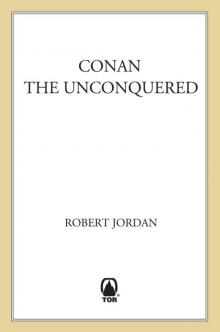 Conan the Unconquered
Conan the Unconquered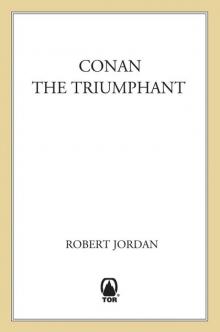 Conan the Triumphant
Conan the Triumphant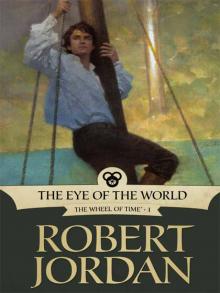 The Eye of the World
The Eye of the World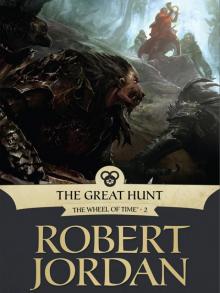 The Great Hunt
The Great Hunt Conan the Victorious
Conan the Victorious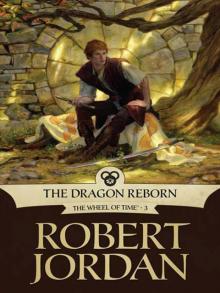 The Dragon Reborn
The Dragon Reborn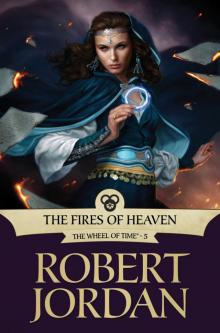 The Fires of Heaven
The Fires of Heaven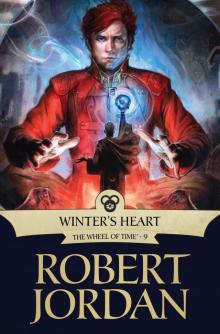 Winter's Heart
Winter's Heart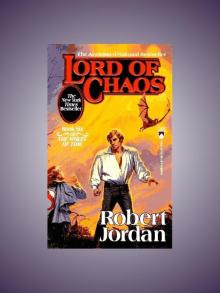 Lord of Chaos
Lord of Chaos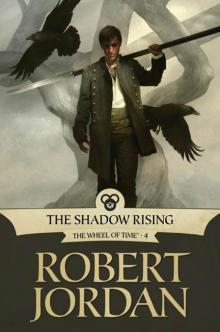 The Shadow Rising
The Shadow Rising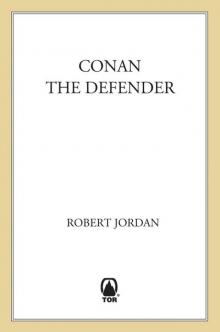 Conan the Defender
Conan the Defender The Strike at Shayol Ghul
The Strike at Shayol Ghul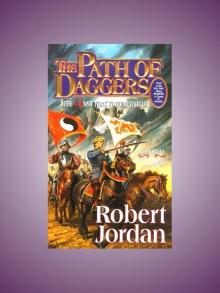 The Path of Daggers
The Path of Daggers A Memory of Light
A Memory of Light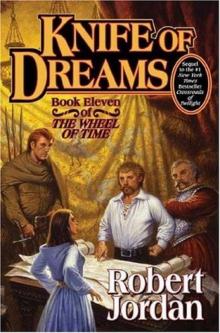 Knife of Dreams
Knife of Dreams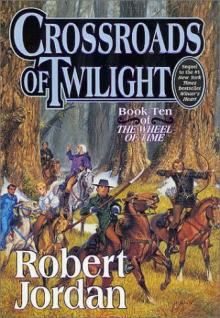 Crossroads of Twilight
Crossroads of Twilight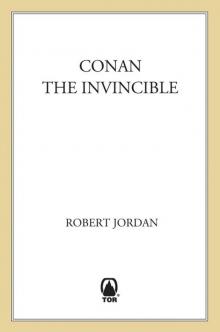 Conan the Invincible
Conan the Invincible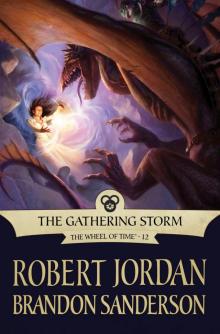 The Gathering Storm
The Gathering Storm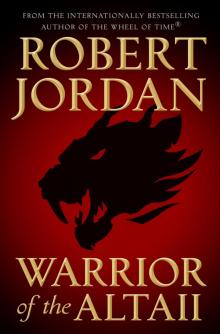 Warrior of the Altaii
Warrior of the Altaii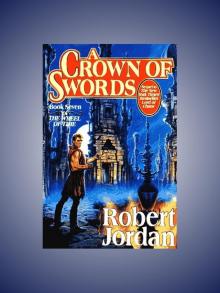 A Crown of Swords
A Crown of Swords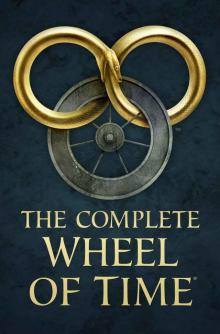 The Wheel of Time
The Wheel of Time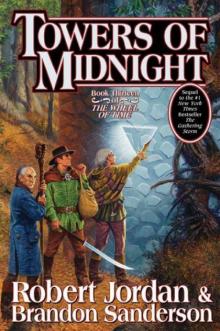 Towers of Midnight
Towers of Midnight Conan Chronicles 2
Conan Chronicles 2 Conan the Magnificent
Conan the Magnificent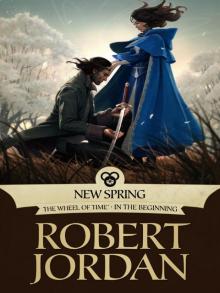 New Spring
New Spring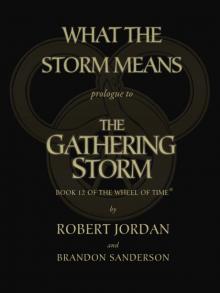 What the Storm Means
What the Storm Means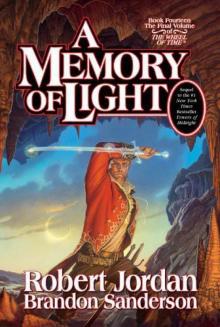 A Memory of Light twot-14
A Memory of Light twot-14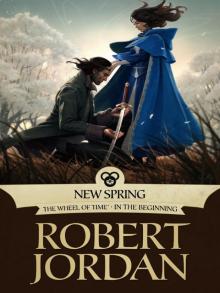 New Spring: The Novel
New Spring: The Novel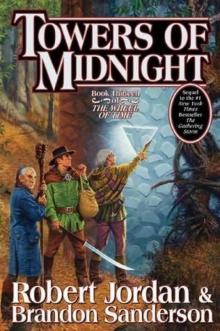 Towers of midnight wot-13
Towers of midnight wot-13 A Memory Of Light: Wheel of Time Book 14
A Memory Of Light: Wheel of Time Book 14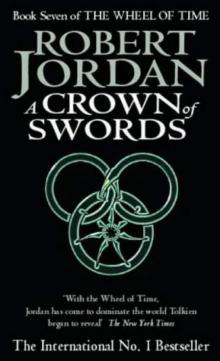 A Crown of Swords twot-7
A Crown of Swords twot-7 Lord of Chaos twot-6
Lord of Chaos twot-6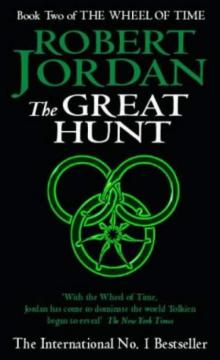 The Great Hunt twot-2
The Great Hunt twot-2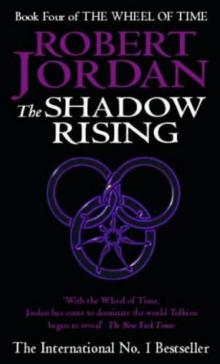 The Shadow Rising twot-4
The Shadow Rising twot-4![Wheel of Time-11] Knife of Dreams Read online](http://i1.bookreadfree.com/i1/04/03/wheel_of_time-11_knife_of_dreams_preview.jpg) Wheel of Time-11] Knife of Dreams
Wheel of Time-11] Knife of Dreams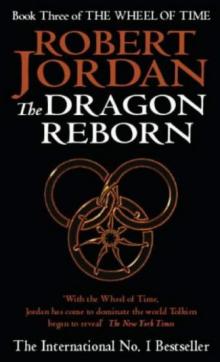 The Dragon Reborn twot-3
The Dragon Reborn twot-3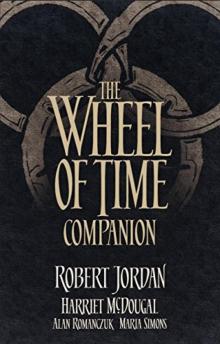 The Wheel of Time Companion
The Wheel of Time Companion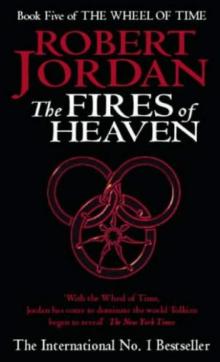 The Fires of Heaven twot-5
The Fires of Heaven twot-5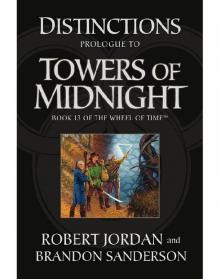 Prologue to Towers of Midnight
Prologue to Towers of Midnight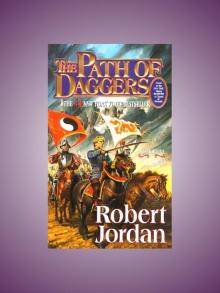 The Path of Daggers - The Wheel of Time Book 8
The Path of Daggers - The Wheel of Time Book 8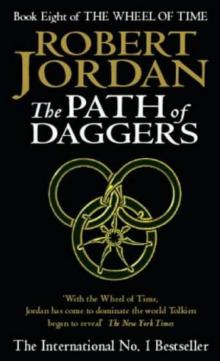 The Path of Daggers twot-8
The Path of Daggers twot-8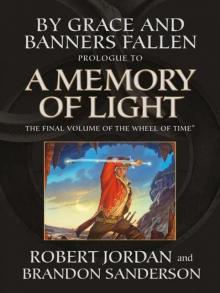 By Grace and Banners Fallen: Prologue to a Memory of Light
By Grace and Banners Fallen: Prologue to a Memory of Light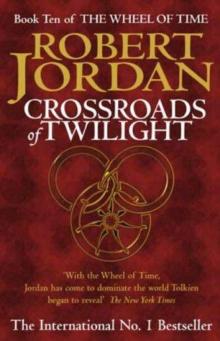 Crossroads of Twilight twot-10
Crossroads of Twilight twot-10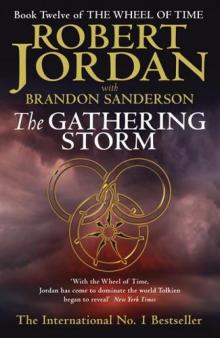 The Gathering Storm twot-12
The Gathering Storm twot-12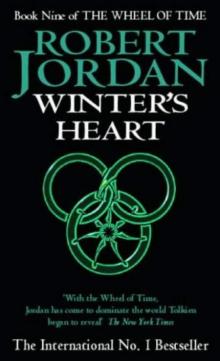 Winter's Heart twot-9
Winter's Heart twot-9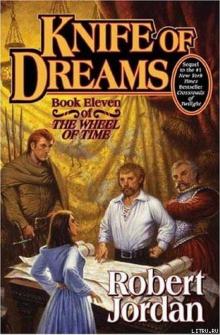 Knife of Dreams twot-11
Knife of Dreams twot-11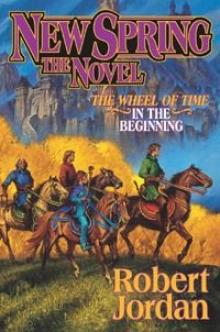 New Spring: The Novel (wheel of time)
New Spring: The Novel (wheel of time)